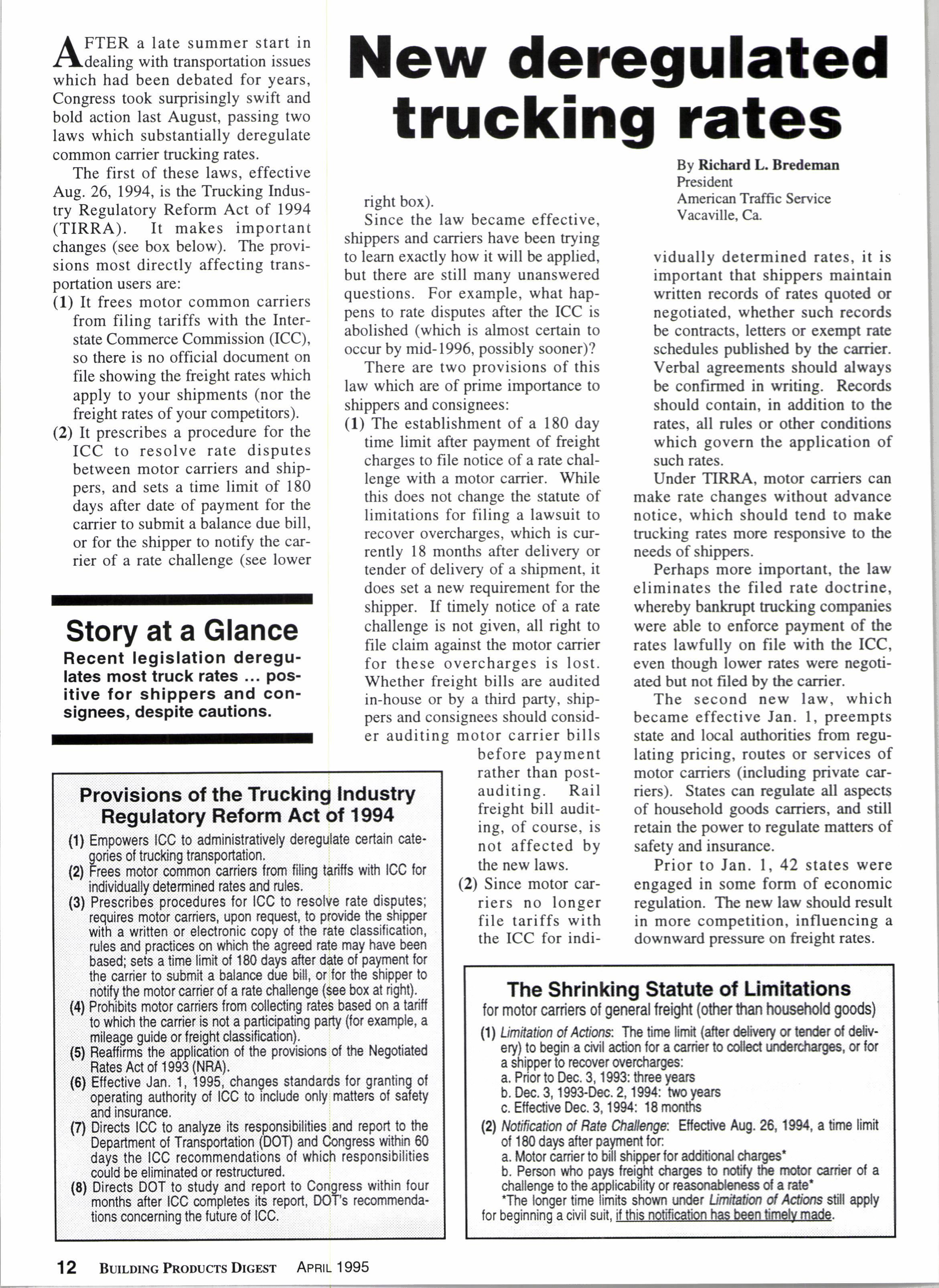
3 minute read
New deregulatedtrucking rates
right box).
Since the law became effective, shippers and carriers have been trying to learn exactly how it will be applied, but there are still many unanswered questions. For example, what happens to rate disputes after the ICC is abolished (which is almost certain to occur by mid-1996, possibly sooner)?
There are two provisions of this law which are of prime importance to shippers and consignees:
By Richanl L. Bredemen President American Traffic Service Vacaville, Ca
Provisions of the Trucking Industry R€$ulatory Reform Act of 1994
{'l} Empowers ICO to administratively deregulate cerlain cate' oories of truckinq transponafion,
(1) The establishment of a 180 day time limit after payment of freight charges to file notice of a rate challenge with a motor carrier. While this does not change the statute of limitations for filing a lawsuit to recover overcharges, which is currently l8 months after delivery or tender of delivery of a shipment, it does set a new requirement for the shipper. If timely notice of a rate challenge is not given, all right to file claim against the motor carrier for these overcharges is lost. Whether freight bills are audited in-house or by a third party, shippers and consignees should consider auditing motor carrier bills before payment rather than postauditing. Rail freight bill auditing, of course, is not affected by the new laws.
(4 Frees motor coftmon'caniers from filing taritls with ICC for individuallv determined rates and rules.
(3) Prescribris procedures for ICC to resolve rate dispules; 'requires motor carriers, upon request, to prodde the shipper with a written or electronic copy ol ths rate classificalion, rules and pradices on which the agreed rale may have been based; sets a time limit ol 180 days after date of payment for the carrier to wbmil a balance due bi$, or for the shipper lo notity ttre motor carrier of a rate challenge {see box at right).
(4) Profribits motor carriers from ollecting rales based on a tadtf 'lo whidr the carrier is not a participating palty (for example, a mileaoe ouide or freiqht classification).
(5) Reaffirmi the applidtbn ol the provisions of the NegotiatedRatesAdof1993(NRA).
(6) Effective Jan. 1, i995; changes slandards for granting ol ' operating auihority ol ICC to include only:matter of salety ard insurance,
(7) Directs ICC to analyze its responsibilities and report to the - ' Department ol Transpodation (DOT) and Gongress within 60 days the ICC recommendalions ol which responsibilities could be eliminated or restructured.
(8) Directs DOT to study and reporl to Congress within fout ' ' months after ICC conipletes its report, DOTs recommenda' tion$ionceming the future of :lCC,
(2) Since motor carriers no longer file tariffs with the ICC for indi- vidually determined rates, it is important that shippers maintain written records of rates quoted or negotiated, whether such records be contracts, leners or exempt rate schedules published by the carrier. Verbal agreements should always be confirmed in writing. Records should contain, in addition to the rates. all rules or other conditions which govern the application of such rates.
Under TIRRA, motor carriers can make rate changes without advance notice, which should tend to make trucking rates more responsive to the needs of shippers.
Perhaps more important, the law eliminates the filed rate doctrine, whereby bankrupt trucking companies were able to enforce payment of the rates lawfully on file with the ICC, even though lower rates were negotiated but not filed by the carrier.
The second new law, which became effective Jan. I, preempts state and local authorities from regulating pricing, routes or services of motor carriers (including private carriers). States can regulate all aspects of household goods carriers, and still retain the power to regularc matters of safety and insurance.
Prior to Jan. l, 42 states were engaged in some form of economic regulation. The new law shouldresult in more competition, influencing a downward pressure on freight rates.
The Shrinking Statute of Limitations
lor motor carders ol generalfteight (ottertnn ttot settold goods) (11 Limitation ol Actidts. The time limit (after ddivery or bnder of ddtvery) to begin a cMl c{bn lor a canier to co0ed wdedwgne, or lor a shipper to recorler oreldrarges: a. Prior lo Dec. 3, 1993: hrce pats b. D€c. 3, 199$Dec. 2, 1994: tm yean c. Effedive Dec. 3. 1994: 18 monhs
(21 Not'ficatiut of Rate ChailengE Effectiv€ Aug. 26, 1994, a lime limit of 180 days after payment for a. Motor canier to tlill stripper for addilional dwgns' b. Percon vrtro pays height dwgs to rdily he mdor canier of a challenoe to the adolicabilitv or reasonabhness of a lde' 'Tlre foiger time iiinits shovln tnder Linihtialt d Aclruls sdl apply lor beginning a cMl suil, il this notificatim has been limely made.










